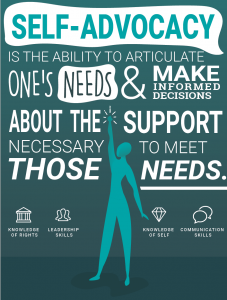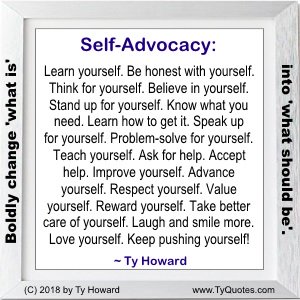A mother and her eighteen-year-old son walked into the Access and Disability Office at the community college and spoke to the secretary.
“My son will be attending classes here and I want to register him for accommodations. We have a meeting with the director, Dr. Sweeney.”
 The secretary welcomed them and contacted the director. When Dr. Sweeney appeared, the mother stood and said, “Hello, I’m Jennifer Grant and this is my son, Michael. We want to make sure that Michael gets the support that he will need to graduate from college.”
The secretary welcomed them and contacted the director. When Dr. Sweeney appeared, the mother stood and said, “Hello, I’m Jennifer Grant and this is my son, Michael. We want to make sure that Michael gets the support that he will need to graduate from college.”
Dr. Sweeney led them to his office and they sat at a round table.
“Thank you for scheduling a meeting with me so we can begin the process to develop an Accommodations Plan. Michael, what is your academic goal?”
“He wants to get an Associate Degree and then transfer to a four-year college,” explained his mother.
“What types of services did you use when you were in high school, Michael?” asked Dr. Sweeney.
“Michael was in modified classes for Math and English. He took alternative tests and had extended time. Here is a folder with copies of his IEP’s and documentation of his disability. Will you help us choose the appropriate college classes?”
“An Academic Coach will verify the documentation of his disability and have him complete an application form. She will work with him to determine his eligibility for various accommodations and then create an individualized Accommodations Plan. One major difference between college and high school is that we don’t offer modified classes for college credit. Michael will have to take Math and English Placement tests to assess his skill levels so that he can be placed in developmental classes or college level courses.”
“We just assumed that he would automatically be put in courses with college credit.”
“High schools are allowed to provide modifications to the curriculum that change what the student learns, but colleges are only required to provide accommodations which change how a student learns. Here at this college we do provide one-on-one academic tutoring, note takers, testing accommodations, alternative textbook formats, and assistive technology training.”
“Michael will certainly benefit from the extra support.”
Dr. Sweeney looked directly at Michael and asked, “Please tell me about your disability and how it affects your learning.”
His mother interjected, “He has received Special Education support since sixth grade.”
“It is important that Michael advocates for his own needs. I would like to hear Michael explain his learning difficulties to me, “ Dr. Sweeney said.
Michael looked nervous and quietly answered, “I have trouble writing essays and reading.”
“How does your disability affect your writing skills?”
“It is difficult for me to organize my ideas and write essays. I always need someone to edit my work since I have trouble with grammar and punctuation.”
 “If you register for an English course this semester, then you might be eligible to have an English tutor who would meet with you each week to help you with writing skills. How does your disability affect your reading?”
“If you register for an English course this semester, then you might be eligible to have an English tutor who would meet with you each week to help you with writing skills. How does your disability affect your reading?”
“I read very slowly and I always had extra time to finish tests when I was in high school.”
“If you qualify, then we can give you an accommodation to have extended time to complete your tests. You might be able to have your tests read orally. How does your disability affect your study skills?”
“It’s hard for me to complete homework assignments on time.”
“We have Executive Functioning tutors who could meet with you to work on skills such as keeping track of deadlines, planning your time, and studying.”
“That sounds good.”
“Before you can register for classes, you’ll need to schedule times to take the placement tests in Math and English. On our website there are sample essays and learning modules to help you prepare. Doing the practice tests will help you become familiar with the testing experience.”
Mrs. Grant said, “In high school, the Special Education teacher communicated with all of Michael’s teachers. Will the Academic Coach inform the instructors about Michael’s needs?”
“The Disability Services Office will send a Confidential Form to his instructors which lists the Accommodations that he can receive. Michael will need to meet privately with each instructor to discuss his learning difficulties and accommodations. If Michael wants extended time for tests or a test read orally, then he will need to contact the Disability Office to schedule when and where he can take the test. In college, students have to advocate for themselves.”
“Things sure are different here,” Michael remarked.
“Yes, now it will be up to you. It will be your responsibility to make and keep the necessary appointments with tutors. Each semester it will be your responsibility to meet with instructors to discuss your learning issues and accommodations. I’m sure that it will be an adjustment, but you’ll figure out what you need to do,” Dr. Sweeney explained.
There was a knock on the door. Dr. Sweeney opened it and invited the woman to sit at the table next to Michael.
“Hello, my name is Mrs. Barnes and I’m the Academic Coach,” she explained.
Dr. Sweeney picked up the folder with the documentation and gave it to Michael.
“I’d like to suggest that you introduce yourself to Mrs. Barnes and tell her why you’re here,” urged Dr. Sweeney.
Michael looked uneasy as he took the folder. He handed it to Mrs. Barnes and said, “Hi, my name is Michael Grant and this is my mom. My IEP’s and information about my learning disabilities are in this folder. I need to meet with you so I can get help at college. Dr. Sweeney was just telling us that I’ll have more responsibility now.”
Mrs. Barnes smiled and said, “He’s right. Let’s go to my office and finish this meeting. We want to give you the support you need to succeed.”
“I can already tell that college is going to be much harder than high school. Having a tutor and getting some accommodations should help me. Let’s get this process started.”
Hi Kathy,
Thank you so much for creating this resource. It serves as great example for students and gives them a taste of what they can expect as they make the transition from high school to college. I work in the Accessibility Resource Center at a Liberal Arts College, and I find that many students are unaware of the changes that occur when it comes to their accommodations, from the self-advocacy process to not receiving specific accommodations that they did in high school.
I will be sharing with incoming students:)